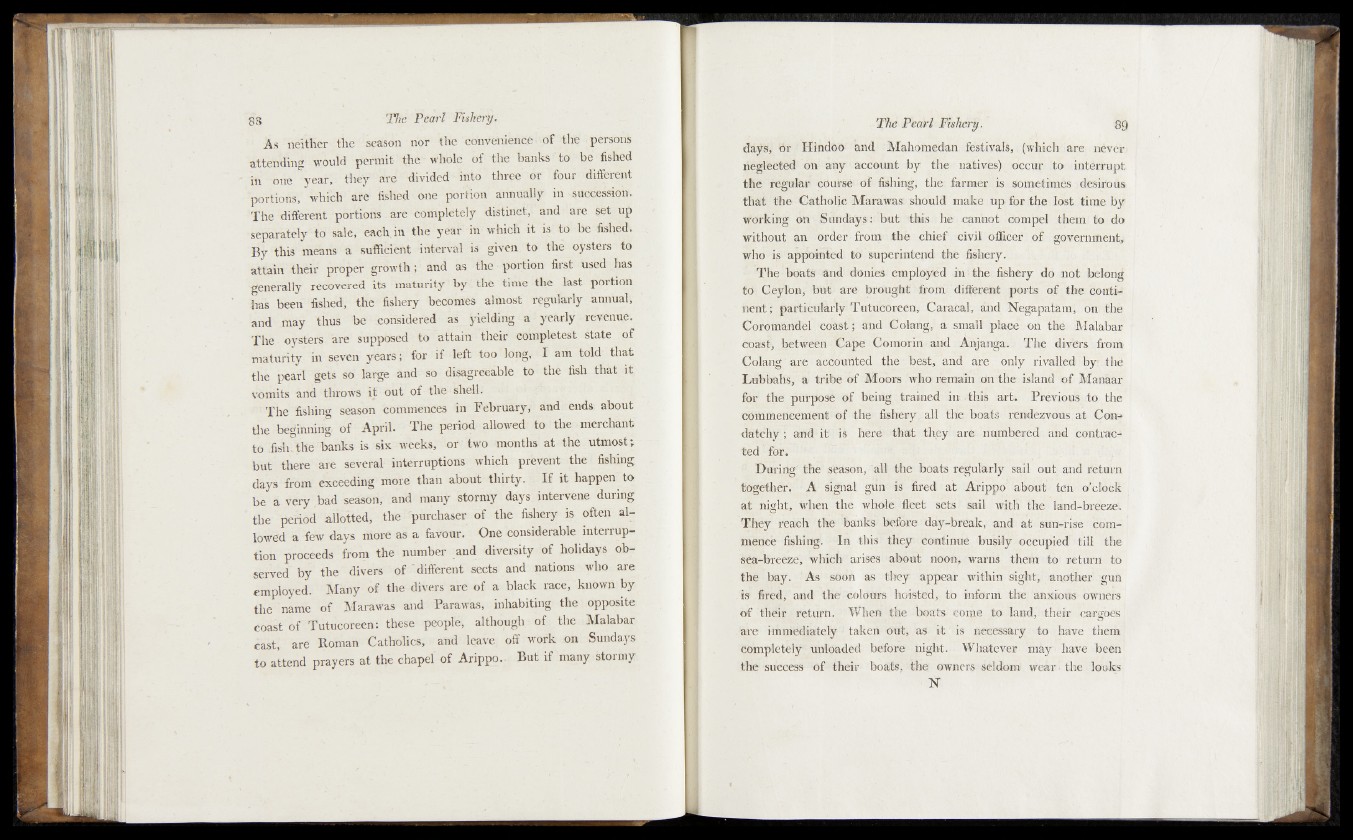
1 As neither1 the ‘season nor 'the 'convetóenc.é.^of f he-, persons
nttehding Would permit the" whole of» the banks’ri<r'|e*fished
iii ^brre^yeai-, they are divided-into' three'or four- different
portions, which arë fished one porAon annually in succession.
The different 'portions - ére-completely distinct,- and are §efe up
"separately'to skle, each, in the ye&i ih which it is to-be fished.
'By This 'tö ë tó a sufficient interval is given to the oysters té
attain their proper grbwth; and as the portion first used has
generally recovered its'maturity by thfe' tiriie the last portion
has been fished, the fishery becomes alhiost regularly annual^
and may thus be .considered as^ yielding a yearly revenue.
The oysters, are supposed to attain- their compietest estate \of
maturity, in seven years ; for if deft too| long, ’ I am told that
the pearl gets sblfirge and so disagréeable to thé fish that fit;
vomits and throws it" out of - the- shell.- 1
r; The fishing season coitimences in February, and ends: about
tiie beginning/ of April. The period .allowed; to * then merchant
to dish^he banks js six weeks, orv two »months: at-the utmost;
but there are s e y e ^ interruptions whiph prevent -the' fishing
days from exceeding more than about thirty. If it happen''to
be a very .bad se&onj.and many stormy - days., mtervène during
' fhe- ^period hilbttedj, :^hê-p«rchaser öf the fishery-is. oftefi air
lowed a few days more as a fervour. One considerable interruption
proceeds from the number and diversity !of holidays ob-
sèrVétf by the divers pf 'different sects and nations who, are
employed. Many of the-divers are of a black race, known-by
the name of Mara was and Parawas* inhabiting th e . opposite
coast of Tutucoreen: these people* although - of; the Malabar
éastr are Roman Catholics, and lpave, off work on Sundays
to attend prayers at the chapel-of Arippo.. But if many stormy
days, hr HlfidOW ffiridr ; Mahoinedan fdstivali,, (which are néverj
neglected oU any | account by the naiivfes) occur: to interrupt
the regular- coursé of fishing, the; farmer lis sometimes desirbiia
•tfiàfèl f t e m a k e Up ffir the lost time by
working on Sdttdéÿs ^ ’but this : life cannot Compel them to do
without ànwëyder.- from .the chief- civil officer of sgavermiient#
whOr;isuapfMfited to superintend the fishery.
“ ■ ‘-The- boats and ebonies employed àa ; the: fishery do 0 | t belong
to Geÿfoâ/'bWî are brought ' from 'diflfereiBt. port# - <o$ïék£ continent
; particularly Tutucoreen, Caracal,-and Negapalàmjïrim, the
CoFohïàndèl- 'cdâlst ; âtid ColangJ à- small place on tkfe. Malabar
ébàé-j?, .beriteëfi Cape Gomotrin-aud Anjanga— T% db^rs i&ifnii
Golang àre ae&unted true bed, and Jre onhiffivcdlediJ bvr tbë
TtfhbaH^ ft tribe -M 'Mows who: remain on t f e island of Manfiàr
for the purposè' of being trained -in; this a rtt Previous do the
commencement- of the fishery. all the boats rendezvous at < Con-*
d&tdhyri annihilé leré-'tbat they .are numbered , and contra»#/
ted • for.
Duririg' the1 s&tson, /all the boats regularly sail out and return
together. A Signal gün ÏS fired at Arippo abodt»
atjnight, when.,the whole -fleet sets Sail with the lamd-brëfezét
They reach the banks bdbre day-break, and at suo-rise I efem-
mence fi&Mhgi In this they continue busily occupied till the
séa-breeze, which7arises-; about noon, warns them to return to
the bay. As soon as they appear within sight; another.-goh
is fired, and thfe36©lot*rs hpisted,, tb Inform the anxibds-owners
of their return. When the boats come to land, their Jcaægbds !
dre tiftmëâi^efy ; takeiï out, as it ris necessary to tove 'them '
hbmpletel^ unloaded befor# hight. Whatever ’inky- have been
the sueeesa fof their boaiM, the owners seldom wear! the looks
■> N